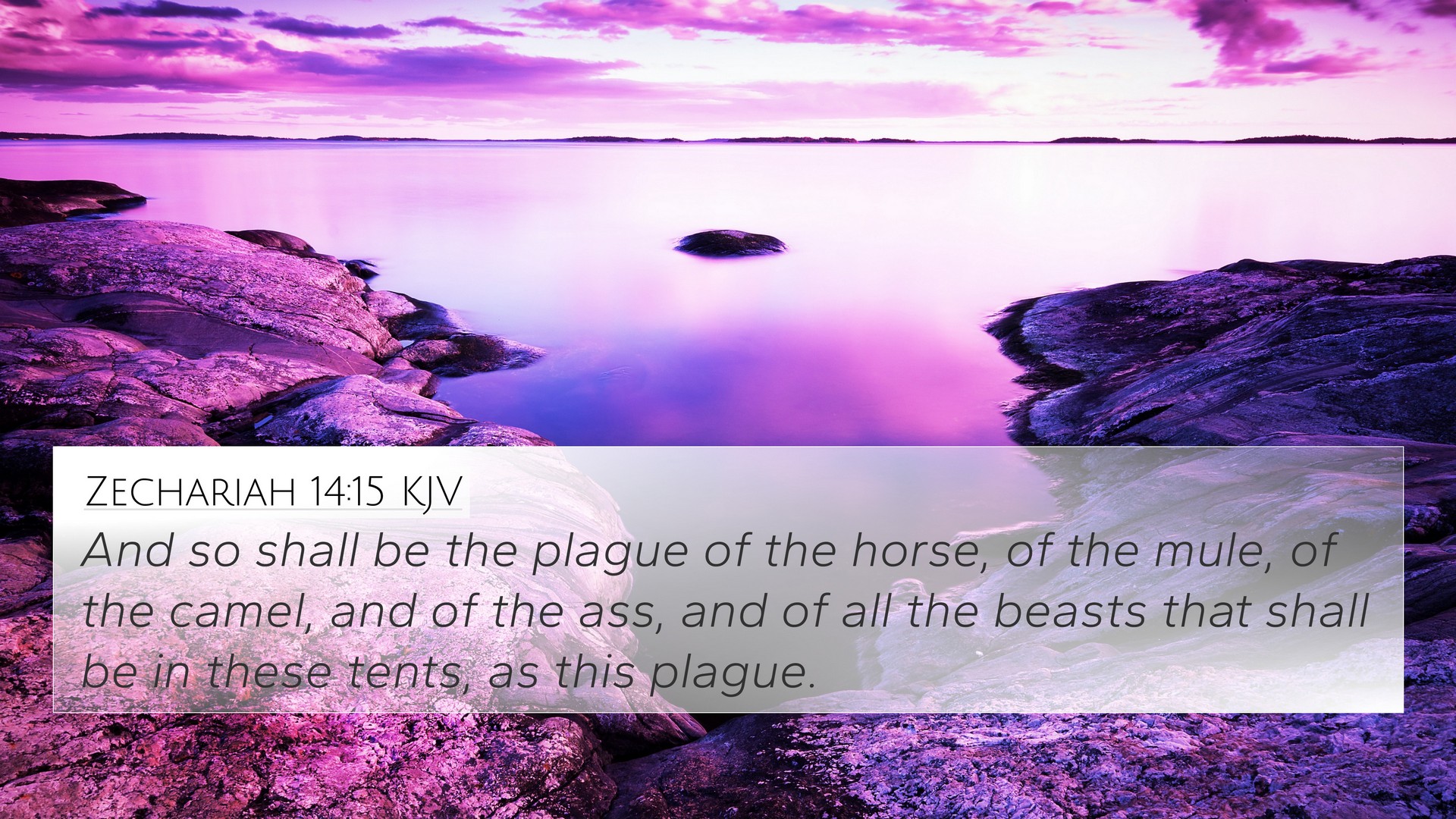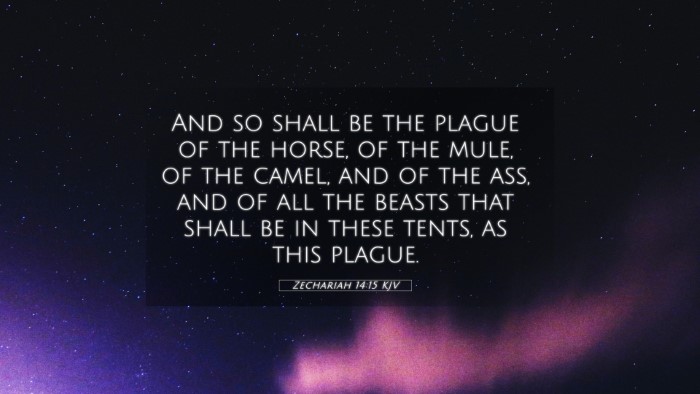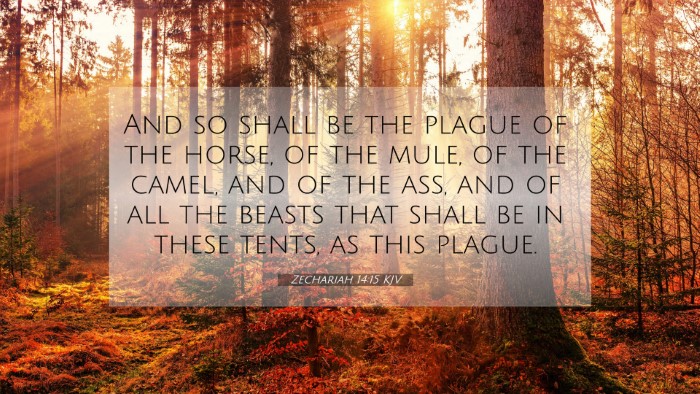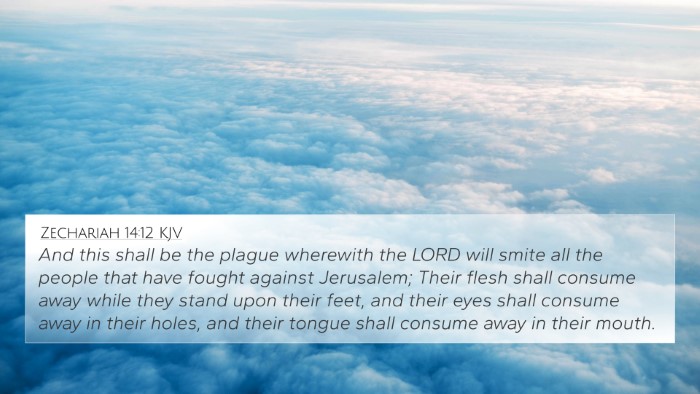Understanding Zechariah 14:15
Verse: Zechariah 14:15 - "And so shall be the plague of the horse, of the mule, of the camel, and of the ass, and of all the beasts that shall be in those tents, as this plague." (KJV)
Summary of Meaning
Zechariah 14:15 describes a specific judgment that will befall the animals of the enemies of Israel during a time of divine retribution. This verse emphasizes that the same plague affecting the people will extend to their beasts, reinforcing the severe consequences of rebellion against God. The diverse mentions of animals – horses, mules, camels, and donkeys – signify the thorough impact of God's judgment, highlighting that all aspects of life would be affected by divine discipline.
Insights from Public Domain Commentaries
-
Matthew Henry:
Henry comments on the extensive scope of the plague as a demonstration of God's sovereignty over not just humanity but all creation. The mention of various animals signifies that nothing is exempt from divine judgment, serving as a warning against rebellion. The imagery used reflects the comprehensive nature of God's authority and the totality of his retribution.
-
Albert Barnes:
Barnes explains that this verse illustrates the inevitability of judgment against those who oppose God’s people. He notes that the “plague” serves as a metaphor for divine punishment, showing that even inanimate parts of existence suffer as a result of sin. The use of animals emphasizes the suffering that results from sinful actions and mirrors the reality that humanity’s poor choices can lead to widespread consequences.
-
Adam Clarke:
Clarke elaborates on the symbolism of the various animals mentioned, highlighting their significance in ancient agriculture and trade. By stating that all will be affected by the plague, he emphasizes the futility of relying on earthly means in the face of divine wrath. Clarke's perspective invites readers to reflect on the need for repentance and the dire consequences of continuing in sin.
Bible Verse Cross-References
- Exodus 9:9-10: The plagues sent upon Egypt illustrate God's power over both people and animals.
- Zechariah 14:12: Expands on the theme of plague and divine judgment upon the enemies of God.
- Jeremiah 50:39: God’s judgment leading to desolation includes animals symbolic of the people’s fate.
- Revelation 6:8: A vivid display of death, highlighting the fate of creatures in dire times.
- Deuteronomy 28:18: The consequences of disobedience extend to livestock, echoing Zechariah's warnings.
- Isaiah 66:3: The themes of sacrificial judgment, wherein animals and their fates signify larger realities.
- Joel 1:18: Discusses how nature and animals suffer due to the land's state, similar to the judgment depicted in Zechariah.
Connecting Themes
The verse serves as a thematic connection point for various biblical texts related to divine judgment, consequences of sin, and the holistic nature of God’s sovereignty. The linkage between different scriptures emphasizes the significance of understanding these connections in a broader biblical context:
- Divine Judgment: Similar themes arise in multiple texts depicting God's power over both humanity and creation.
- Comprehensive Retribution: Verses that connect the fate of people to their livestock serve as a reminder of the pervasive nature of sin.
- Symbolism of Animals: The presence of animals as symbols of people’s fortunes illustrates the interdependence of humanity and nature in biblical literature.
Tools for Bible Cross-Referencing
Engaging with cross-references can enhance understanding of scripture, revealing how various verses relate to one another through thematic connections and similar messages. Here are some suggestions for effective cross-referencing:
- Utilize a Bible concordance to find relevant verses easily.
- Engage in cross-reference Bible study methods to deepen biblical literacy.
- Develop your own Bible cross-reference guide for personal study.
- Investigate comprehensive Bible cross-reference materials for extensive analysis.
Conclusion
Zechariah 14:15 invites readers to reflect on the consequences of rebellion against God and the totality of His judgment, emphasizing the interconnectedness of all creation in divine matters. By cross-referencing this verse with others, one can gain a richer understanding of Biblical themes of judgment, sin, and accountability, linking them through scriptural narratives that resonate across both the Old and New Testaments.
As you study, consider how these insights might support your spiritual journey and deepen your relationship with Scripture.



